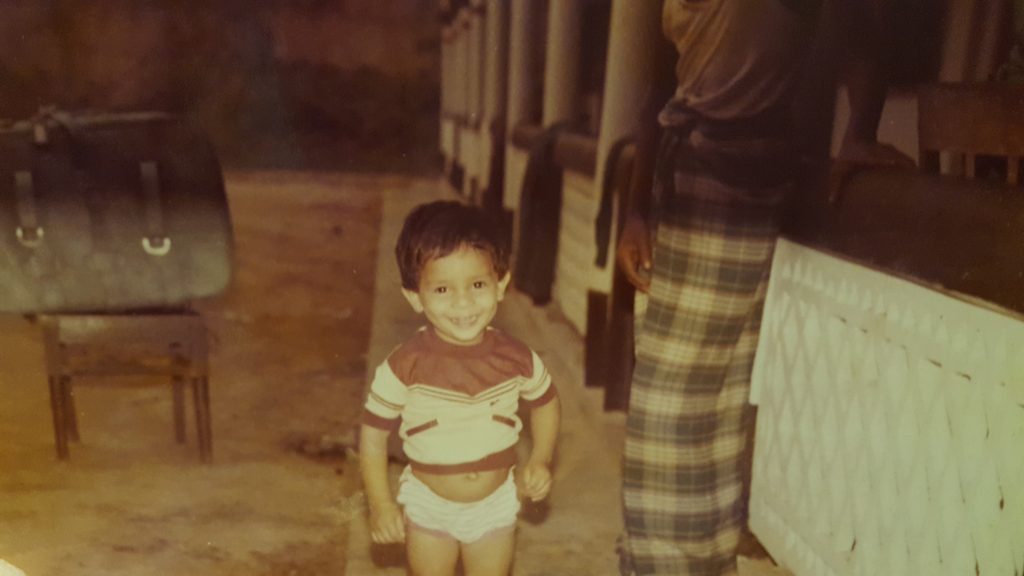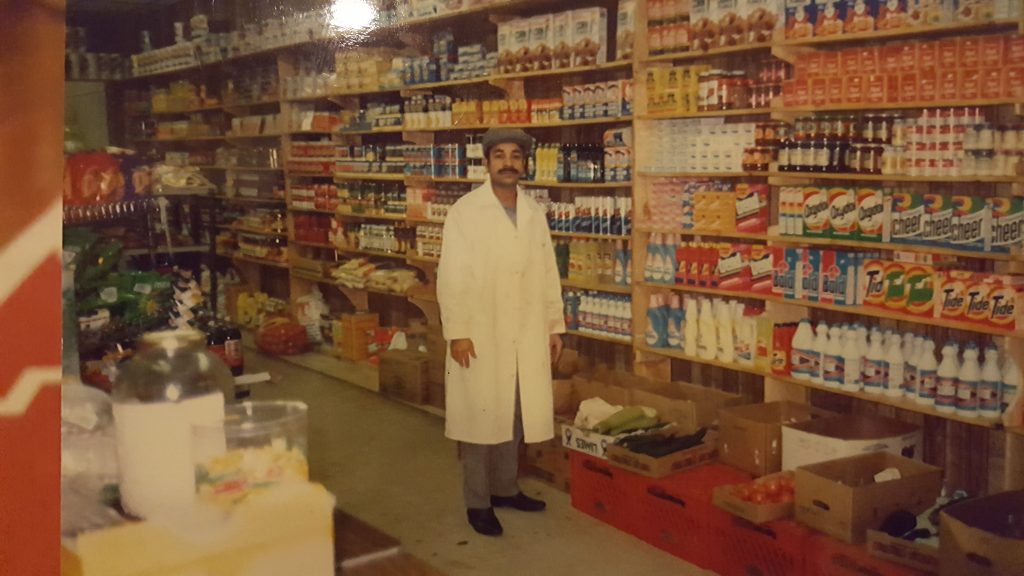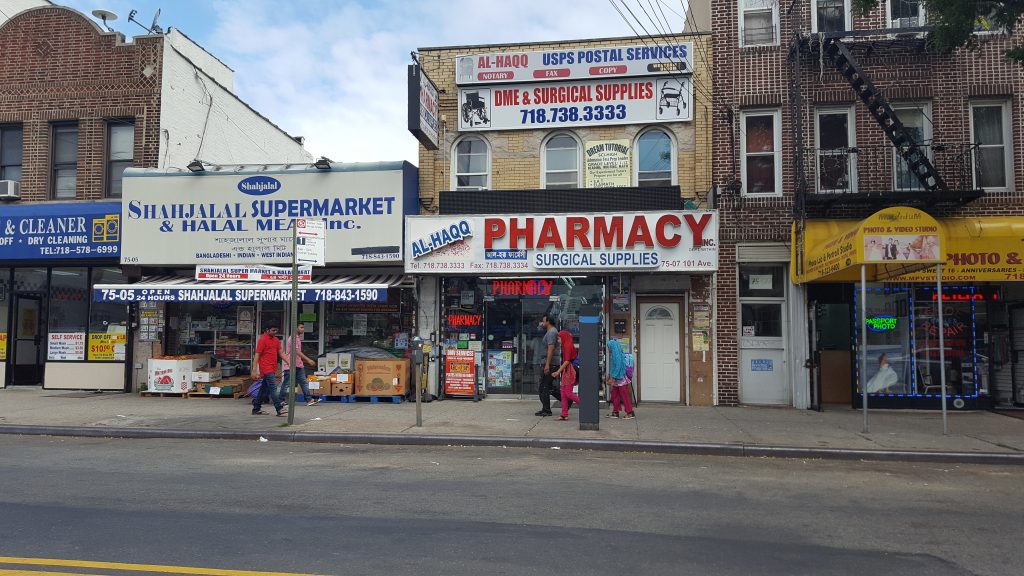In 1985, my father and my mother left their village in Sylhet, Bangladesh, with me as their only son, then three years old. We moved into a small neighborhood in Brooklyn just bordering Ozone Park in Queens, New York.
It was clear that we were one of the first Bengali American families to come to this neighborhood. I grew up seeing different environments and cultures around me. At the time of our family settling in, the neighborhood was primarily Italian and Puerto Rican, and we quickly felt like outsiders. There was at first some hostility between these different ethnic groups coming in to the neighborhood and on a day to day basis it was difficult to find our place. Likewise, at school, I was one of only a few who looked like me or spoke the language I had at home. It was difficult to fit in at the time.

The author, Adam Samad, on his last day in Bangladesh before moving to America. copyright Adam Samad
Like so many other immigrants, my father worked at a number of odd jobs to make ends meet and give his kids a decent life. Then, he finally bought a storefront and converted it to the first and only Bengali store in the area. Al-Amin Grocery and Halal Meat was in some ways foreshadowing what would become an important location for Bengalis in New York.

Adam Samad’s father in the 1980s in his store Al-Amin in Queens, NY. Copyright Adam Samad
The other immigrant Bengali elders and my father in this neighborhood encouraged other members from their village back home to immigrate to America for a better life for their children. Gradually, the neighborhood transformed into an important center for Bengali American life. More and more Bengalis would immigrate to this country and then move into our neighborhood. This area became a hub, so to speak, where Bengalis could find community, and new immigrants an anchor to settle into life here. Over the years, I found and grew up with more and more people who understood me and my family and our cultural values, dress, food, language and so much more. After my own exploration of the culture after I turned 16, including frequent trips to Bangladesh, I found greater pride in this growing community in Queens that held on to our culture and values.
Over 30 years, Ozone Park has become a vibrant and active Bengali community of several thousand. Now, almost every other store in the neighborhood is Bengali owned, every other house is Bengali owned, many Bengali restaurants have popped up as well as 15 or so Bengali focused grocery stores and other commercial locations catered to our specific community.

Copyright Adam Samad
But we were in no way insular. We also interacted with other ethnicities and communities nearby, and many understood and came to say that the Bengali Muslims of the area were hardworking people, conscientious citizens with low crime rates. A number of Bengali officers and cadets and sergeants also started to spring up.
But perhaps one of the most important parts of this beautiful ethnic community was also the Bengali mosques where families and children would gather and find ways to be conscientious citizens of this country as exemplified through our religion. I would often drive by the mosques only a few blocks from my house, and see the children playing and laughing outside. There were always classes, events and lectures taking place.

Copyright Adam Samad
One of these was the house converted to a mosque only a few blocks from my home, which was run by Imam Alauddin Akonjee.
Imam Akonjee was a positive man, never serious, always approachable and warm with this softness and lightness in his eyes. Never had I seen him without a smile. And one of the most consistent things he encouraged all of us to have was positive family values. He often stressed in his talks to find ways to be close and connected to your children and this is something that resonates deeply with me now that I am a father of two children who are being raised in this same neighborhood that I grew up in. In one incident after a community member scolded some children who were loud, the Imam sad in a gentle way that if we scolded the children they would not be comfortable at a mosque. It was incidents like this and others that actively encouraged and brought in more younger Muslims like me to want to attend the mosque and learn the wonders of this peaceful religion. Rather than alienating a younger generation, his gentleness encouraged them to be involved.

Imam Akonjee.
The sad tragedy of what happened to him and his assistant a few days ago has threatened our entire community, and it is also a threat to what makes America great: allowing for a landscape where a community like ours can exist.
I believe whole heartedly that this shooting is a hate crime, a result of the racial atmosphere and rhetoric going around in society in general. This Imam was the last person to have hostility with anyone and the disregard by the media has upset us even more. At first, we overheard this to be a parking dispute, but the Imam doesn’t drive. Then we heard it was a robbery, but the $1,000 he was carrying with him was on his person after his body was left dead. It’s a relief that someone has been caught and we hope that the facts and truth will emerge.
The result of this incident, though, is our once peaceful little community in Ozone Park is now living in fear. My aunt in hijab who usually walks ten blocks every day to our home and sees it as a quiet exercise was scared to leave yesterday and asked for a drop off by car. To an outsider, my father can easily be mistaken for an “Imam.” I fear for his life because he wears a topi on his head, just like Imam Akonjee, has a bigger beard and wears ethnic clothes. The majority living in this area do. And they were able to do this freely and peacefully in this country because this is what America has welcomed: where community can be safe and hold on to their ethnic and cultural values.
Our community mourns the loss of two of our wonderful pillars, and what was once an undisrupted, peaceful place where we could express our culture and ethnic roots. Our community is now threatened, and all of America should mourn the impact this may have on the ability to have the sort of places, like ours in Ozone Park in New York, which make the country great.





